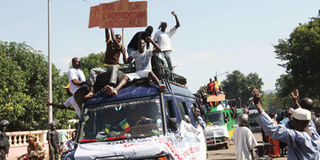Mali prepares for war despite reticent neighbours

PHOTO | HABIBOU KOUYAT People hold banners sit on a truck during a protest called by the Coordination of Patriotic Organizations in Mali (COPAM) against a foreign military intervention in Mali to reclaim the Islamist-controlled north. 300 to 400 people according to police, 800 according to the organisers, marched to the Defence Ministry to "support the Malian army" said COPAM's president Younouss Hameye Dicko.
What you need to know:
- Violence is a symptom of tensions that subsist months after a March coup that ousted president Amadou Toumani Toure, who had been in power for 10 years
- Talks are planned for October in the capital so that all the players -- political parties, civic associations, religious bodies and the army -- can agree on how the political transition should be handled, said a source in the president's office
- However, the word from the presidency is that if there are to be talks, then it should be with the Tuareg separatists of the National Movement for the Liberation of the Azawad (MNLA); perhaps even with Ansar Dine (Defenders of the Faith) the Islamist group led by former Tuareg rebel leader Iyad Ag Ghaly
BAMAKO
Mali's rulers are preparing for war to free the north from armed Islamist groups: this was the message from Bamako after a UN meeting, despite the reservations of some of its neighbours to an international taskforce.
"We felt a commitment from the international community at our side, a solidarity with Mali" a source close to President Dioncounda Traore told AFP on Thursday.
He was speaking a meeting Wednesday in New York, on the sidelines of the General Assembly, which was devoted to discussion of the Sahel crisis.
Mali's authorities knew that neighbours Algeria were trying to make common cause with Mauritania and Niger to oppose the deployment of foreign forces in Mali, said the source.
"But Paris will do all it can to bring about the convening of the Security Council and a resolution authorising intervention," the official source added.
In Bamako, "people don't ask 'When is the war going to begin?' but 'How do we set up all the conditions necessary to do it?' For us, the intervention isn't far off, it is being prepared," the source concluded.
For Madou Diallo, a professor of international law at the University of Bamako, the response from the international community had been "mitigated" and "reserved".
"We understand the recommendation of 'extreme caution' on the part of the Secretary General of the UN, Ban Ki-moon, because this war could lead to humanitarian disasters," Diallo said.
"But the Malian population is generally really in favour of intervention in the north" he added.
"That's what you hear in the streets."
Mali's newspapers on Thursday however were preoccupied by other matters.
They gave over their main headlines not to the UN debate but to clashes in Bamako between rival factions of the police force that left two people wounded.
Such violence is a symptom of tensions that subsist months after a March coup that ousted president Amadou Toumani Toure, who had been in power for 10 years.
"In Bamako, there is currently a very fragile link between the politicians and the military," pointed out Gille Yabi, the Dakar representative of the International Crisis Group (ICG).
"The Malian army is a post-coup army, that needs to be recognised, (by) giving a role to the ex-junta, which represents an important clan within this army."
A national commission for negotiations
Talks are planned for October in the capital so that all the players -- political parties, civic associations, religious bodies and the army -- can agree on how the political transition should be handled, said a source in the president's office.
The creation of a High Council of State has been proposed, with two vice-presidents, one of whom would be responsible for defence.
That post might even go to the coup leader Captain Amadou Haya Sanogo.
"We can doubt this, however, given the opposition of certain international parties and notably the United States to this appointment," Yabi said.
Finally, a special committee could be set up to hold talks with the armed groups now running the north of the country.
However, the word from the presidency is that if there are to be talks, then it should be with the Tuareg separatists of the National Movement for the Liberation of the Azawad (MNLA); perhaps even with Ansar Dine (Defenders of the Faith) the Islamist group led by former Tuareg rebel leader Iyad Ag Ghaly.
But they are not prepared to sit down with the Movement for Oneness and Jihad in West Africa (MUJAO) nor with Al-Qaeda in the Islamic Maghreb.
The MNLA's European spokesman Mossa Ag Attaher wrote to the UN chief Ban that their group was "the only objective, credible and unavoidable ally in the struggle against the dark forces implanted" in northern Mali.
The problem is that the MNLA has been largely sidelined by the Islamist forces now in control of the north.




